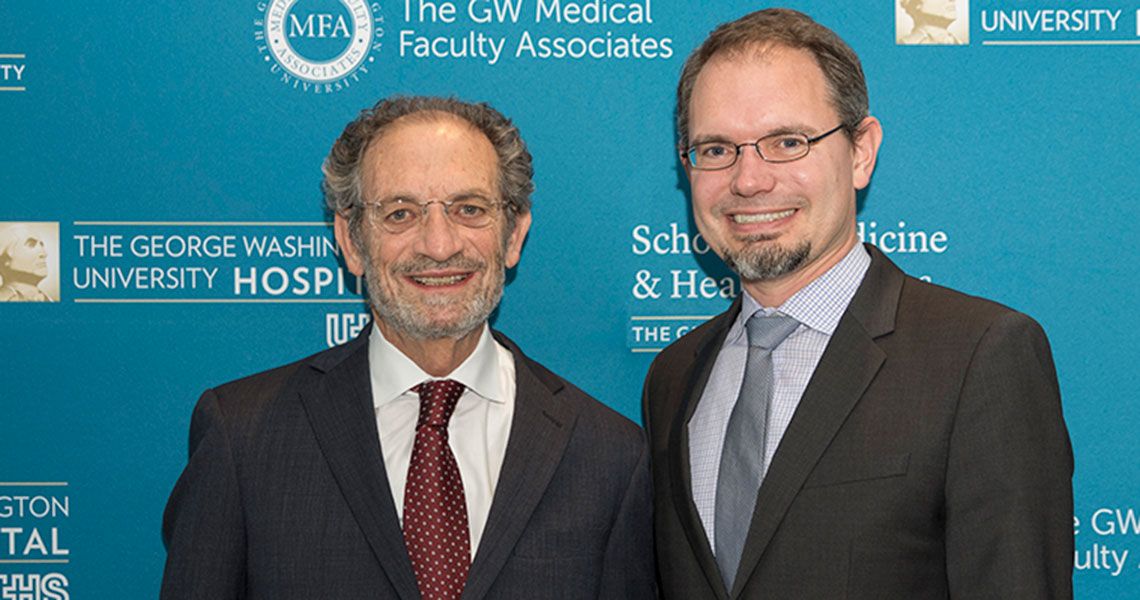“How can we improve suicide prevention services for refugees in the United States, as well as create feasible solutions in settings within the U.S. where refugees are commonly resettled but there is almost no psychiatric care?” asked Brandon Kohrt, M.D., Ph.D., RESD ’13, from the Duke Global Health Institute at Duke University.
Kohrt came back to the George Washington University School of Medicine and Health Sciences (SMHS), to deliver the 22nd Annual Seymour Perlin, M.D. Lecture on Suicidology on Dec. 10. Perlin, Professor Emeritus of Psychiatry and Behavioral Sciences at SMHS, led the school’s psychiatry residency program from 1977 to 1993. The Seymour Perlin, M.D. endowment fund was established in 1987 to honor the renowned leader and mentor who specialized in the field of suicidology and support an annual grand rounds lecture series focusing on suicide.
In his presentation, “Suicide Prevention: Cross-Cultural Perspectives for Refugees and Global Mental Health,” Kohrt addressed how people think about suicide from a global perspective and how that can inform how we better treat refugees in the United States.
“I am very pleased that we could call attention to the challenging and highly prevalent mental health needs, and especially suicide, among refugees in the United States and around the world,” said Jeffrey S. Akman, M.D. ’81, RESD ’85, vice president for health affairs, Walter A. Bloedorn Professor of Administrative Medicine, and dean of SMHS.
“The United States is the largest recipient of Bhutanese refugees, about 800,000 have settled here,” said Kohrt to an auditorium of medical students, psychiatry residents, and faculty. “If you look at refugees in the United States, Bhutanese have a suicide rate of 24.4 per 100, 000. This is a higher suicide rate than when the Bhutanese were living in refugee camps in Nepal, or for Bhutanese resettled in other countries.”
Disaster, war, conflict; trauma and abuse; discrimination; stresses of acculturation and dislocations; isolation and lack of social support; are all important risk factors according to Kohrt and part of refugees’ experiences, making them a highly vulnerable group. However, refugee resettlement policies in the United States often resettle refugees in rural areas where mental health services are difficult to access. They also separate members of extended families that had lived together for decades in refugee camps, sending them to different regions of the United States where they can no longer maintain their connectedness.
Kohrt, whose research focuses on mental health in Nepal where he has worked since 1996, told the story of a 41-year-old Bhutanese refugee. This woman had a history of mental health problems, but her condition was not documented because her family feared it would jeopardize their entrance into the U.S. emigration to the United States. After four months here, she began feeling distressed and ended up in the emergency room claiming that she was seeing demons and having suicidal thoughts. Kohrt spoke with her family, discovering their deep concern for her wellbeing. The patient was hospitalized for five days where she was diagnosed with Mania Depressive Disorder with psychotic features. She went on to receive outpatient care for 18 months.
“The take home message here is the concept of ethnopsychology, the idea that every cultural group has their own way of understanding emotions, feeling, senses, suffering,” he said. There are two key pieces to this for the Bhutanese refugees, explained Kohrt. “One is the idea of the heart-mind, the location of emotions and memories; and other is the idea of the brain-mind, where logic and social control and expectations are all modulated.”
Heart-mind problems, such as sadness or worry, are seen as socially acceptable. However, people with brain-mind problems are stigmatized. They are alcoholics, people with brain trauma of some kind, or psychotic, he explained.
Kohrt discovered his patient’s biggest stressor came from her husband and his attempts to assimilate in U.S. society. The woman, a vegetarian for religious reasons, was being forced to cook meat by her husband, who though that cooking and eating meat meant adopting Western culture, an act she felt the action was condemning her entire family. “One of the simple things we did was have the family use different utensils to prepare the meat, allowing the husband to engage in this American identity, as he chose to, while allowing the wife to maintain her sense of symbolic purity,” he said.
What is driving distress among refugees worldwide and what are the risk factors? Kohrt challenged the audience to look beyond what he referred as “exotic” trauma, using the example of child soldiers. “People immediately assume that being a child solider is awful and ignore all the other complicated things about their lives that actually drive mental health problems,” he said. Focusing on child development, trauma and flight process, and refugee camp conditions can greatly influence the trajectory towards suicide risk, he explained.
In closing, Kohrt focused on prevention, explaining that it is important to foster social connectedness, family approaches, as well as promote cultural practices. “Start early. We know that people who attempt suicide in adolescence are at the greatest risk of increasing the legality of their attempts.”
Ethnopsychology provides methods for comprehending how those within a particular refugee culture perceive, think about, and respond emotionally to adversities in ways that are different from typical North Americans. Applied to suicide prevention, ethnopsychology provides methods for tailoring suicide prevention campaigns and psychotherapies so that they are better fit and more usable by expanding refugee populations.



